The Chieftains have been thrilling audiences with traditional Irish music for an amazing 55 years, with Paddy Moloney on uilleann pipes, tin whistle, and amusing banter for the whole time. The band is filled out by longtime band members Kevin Conneff (bodhran, vocals) and Matt Malloy (flute), with plenty of young talent along for the ride.
They are also known for their collaborations with artists from other musical worlds, including the likes of the Rolling Stones, Van Morrison, Sinead O’Connor, Sting, Pavarotti, and many others. Along the way, they have released roughly 50 albums and won six Grammy awards.
This interview with Paddy Moloney was for a preview article for noozhawk.com for the concert by The Chieftains on 2/21/17. It was done by phone on 1/31/17 (photo courtesy of The Chieftains).
Jeff Moehlis: Hi, Paddy. This is Jeff from Santa Barbara.
Paddy Moloney: Oh, I’m looking forward to coming to Santa Barbara. I remember on one occasion – [laughs] nothing to do with the tour – I was in Boston because my son graduated from MIT and became a rocket scientist, but I was going there on tour and I got the flu. I was outside the door and there was three or four feet of snow in Boston, and I had to go back in and follow up the next day. I got to your Four Seasons – I think I was staying at that hotel – and they had a big open fire [laughs]. It was just like being at home. Within two or three days I was cured [laughs].
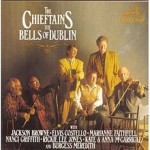
So I have good memories of Santa Barbara, and some funny ones. It’s one of my absolutely favorite cities. San Francisco has always been kind of a number two on my list. Jackson Browne is out there. I remember stopping off at his house going to Santa Santa Barbara, and he treated us to lunch and some delicious wine [laughs]. You know, Jackson recorded with us a couple times, and I recorded on one of his albums.
But that probably has nothing to do with what you want.
JM: That’s fine. I’m happy to hear your stories.
PM: You know, that’s one thing that I have to do, incidentally. I did a documentary which included my wife in it – they said that she was better than I was [laughs]. It just came out a couple of months ago. But the stories… There was six and a half hours of gobbledygook from myself [laughs], which can be put into a book, which they’ve been trying to do for the last ten years. Well, eventually we’ll get around to it.
JM: What can people look forward to at the concert?
PM: Well, you know we have three of us out there. Sean Keane, our fiddle player – Sean has been with us since the mid-60’s – he doesn’t like to travel anymore. That’s fair enough. But he still plays with us, so there’s still four of us around, you know. Three of us with, I would say, a team of experts… I mean, they’re geniuses, young geniuses that I’ve been keeping an eye on for many years.
Two of them are the Pilatzke brothers – Jon and Nathan Pilatzke. They do a style of dancing that comes from the Ottawa Valley, and it’s to Irish music of course, and sometimes Scottish tunes as well. But it’s a wild kind of dancing. I was introduced to them in Toronto fifteen years ago, after a concert we did with a symphony orchestra. Somebody said, “You’ve gotta check these guys out”, you know? And I couldn’t believe it [laughs]. I never saw this before [laughs]. I mean, those legs! Everything flying all over the place! [laughs] They’re absolutely terrific. And then, of course, Jon turns out to be a master fiddle player. He’s playing where Sean would take over, besides the dancing.
And right beside them the most beautiful, incredible fiddle player from County Clare. Her name is Tara Breen. Tara, incidentally, not only plays the fiddle in that tremendous style that Sean plays in – Sean Keane does a Clare style of fiddle playing – but she gets up and does a few steps of dancing during her own little act. I mean, she’s brilliant, this young girl! And then at the end of the show… I discovered that she plays the saxophone [laughs]. She said, “Who told you that? Who told you that?” [laughs] I said, “Now, you’re not coming on tour unless you play the saxophone” [laughs]. So the poor girl has this beautiful saxophone, and she blows everyone away at the end of the show, you know? As a solo piece. So that’s the fiddle side of things.
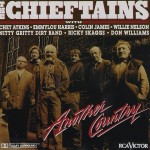
We have Jeff White playing. Jeff has played with us for fifteen years now. Jeff is Vince Gill’s right hand man. Some people can’t distinguish between their voices [laughs] sometimes, you know, they’re so alike. Jeff helped me a lot when I was doing the series Down the Old Plank Road, the two albums we did together, and introduced me to an awful lot of the greats, as well. We had done Another Country with Willie Nelson, way back in ’92, and Emmylou Harris and Chet Atkins and some of those greats, you know? We will show, incidentally, sort of a little film, six or seven minutes, before we come onstage, about the career with The Stones and Van Morrison and all that. We’re going to show that, and one of them has Chet in it. Jeff is brilliant. He comes a plays quite a lot, in Ireland. And he’s getting married, and we’ll go to his wedding [inaudible, laughter].
You know, I’m leaving out The Chieftains. You probably know about them. You have Kevin [Conneff] since the ’70’s, playing bodhran and singing great. And Matt Molloy. I mean, where would you get the likes of him? He has been named as the the best traditional flute player in the world. It’s just incredible. And I’ll pipe up myself a few tunes, on the pipes and the tin whistle.
You know, I’m not leaving out the ladies. There’s two other ladies in the band. There’s eight or nine of us onstage. We lost Derek Bell – “Ding Dong Bell”, as I used to call him. Derek died about twelve years ago. There was a void there, there was a hole. I had a cello instead – I couldn’t possibly put a harp in, you know [laughs]. Too much. But since then, and he must’ve been waving his finger or a big stick at me, he said, “C’mon, there’s a lovely harp player called Triona Marshall, that you have to get into the band.” So for the last twelve years she’s been with us now, and her and I do a lot of duets together. If I’m doing something special, I always love to have Triona beside me. But her expertise on the harp, and rendition of “Carolan’s Concerto”, I’ve never heard that before. Anyway, I’m boasting, but I honestly feel that once you hear it, it’s incredible.
And then, finally, six or seven years ago I heard a voice that came from the Isle of Lewis, off the west coast of Scotland. It’s a Scottish Gaelic community, and they speak in Scottish Gaelic, and they sing and they do this mouth music… [sings] Ah, most beautiful, I could not believe. So I said, “Would you like to come and guest with us” on one of the tours. So that was seven years ago [laughs]. Once you get connected with The Chieftains, they just turn up then! [laughs] I mean, I don’t call them up and say, “By the way, you’re on again this year.” [laughs] No, it doesn’t work that way. It just all happens, you know? And Alyth [McCormack] sings a version of “Foggy Dew”, for instance that I did with Sinead O’Connor, but she put her own stamp on it, and it’s so, so beautiful. She does some of this port-a-beul, this mouth music as well. And she even gets up and dancing.
There was a program done on Nelson Mandela, and I was asked to write a jig for it. His middle name is “Troublemaker” [laughs], so I called it “The Troublemaker’s Jig”. He would love, incidentally, to get up and do a little bit of prancing around and dancing with those lovely girls from The Corrs, the Irish group The Corrs who have sold millions of albums. Anyway, he used to get up and do that. So we do this old style of house dancing, called set dancing. They still do it in my grandmother’s house, which I grew up listening and watching and often did. So we have a group that does the set dance for us.
Besides all of that, we have one of your local choirs. I got to do a little bit of music that I wrote for it, a Yeats poem, “Never Give All the Heart”. It’s on one of the albums. Brenda Fricker did it – you know, she won an Oscar for My Left Foot. The choir and Alyth are going to do that.
And then we’re going to do music from the Long Journey Home, which won two of our Grammy’s for us. We have six [laughs] – I should boast a little bit.
JM: You deserve to.
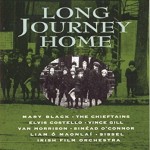
PM: [laughs] So the choir will sing “Shenandoah” and “The Night that Larry was Stretched” – that’s quite a fun piece with a bit of a dance in the middle. And then we do the “Anthem” – Elvis Costello wrote the words for that from The Long Journey Home, and I wrote the music for it.
I was mentioning about the video at the beginning, but also during the show I want to show a little bit of Matt Molloy… One of his flutes and one of my tin whistles went up onto the International Space Station, and Cady Coleman was up there five or six times, she’s a flute player, and she sent on St. Patrick’s Day a video of herself. She took my tin whistle to outer space! My tin whistle was floating around, you know? She plays this tune called “Fanny Power”. So what we do is we let it go on, and then we join in halfway and develop the whole thing onstage. It ends up in Ireland, the video, shows the island of Ireland from outer space. It’s just all different fun things.
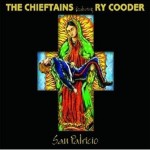
And San Patricio – there was a battalion who fought with the Mexicans in 1847, and a lot of them got hanged. So I’ve written quite a bit of music, and I brought in Ry Cooder as well on that project. He was very much a part of it as well.
JM: You played in Santa Barbara in 2010, and Ry Cooder was along for the show. It was a great show.
PM: That particular show, I’m glad you remember that. So we’ve been adding a lot of things to the concerts. Every year there’s something new, something fresh.
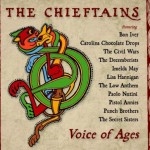
The other one I’m going to do… Incidentally, on the last album to celebrate the 50 years, instead of, you know, picking up the phone and saying, “Hello Mick [Jagger]. Hello Sting. Hello Marianne [Faithfull]. Can you do something for our 50th?” [laughs], I came forward a generation, if you know what I mean, the younger people like Bon Iver and The Decemberists, all of those incredible young singers and groups. There’s one, Paolo Nutini, a wonderful musician that we have over here, and a great friend of T-Bone Burnett, who introduced me to him. There’s a song there “Hard Times” – it’s a Stephen Foster song. So we’re going to perform that song for the first time ever on the tour. It just happens to be a brilliant song.
We have local dancers, incidentally. I’m mentioning San Patricio. We have a pipe band as well, pipers from Santa Barbara. We’re going to do the San Patricio march, “March to Battle”. So that all sort of weaves into that little hour and a half [laughs]. At the end we get the audience up dancing on a tune. You probably remember that where they do this “Andro” thing.
JM: You’ve been performing with The Chieftains for a long time now. What do you remember about the first time you toured America?
PM: John Lennon and Yoko Ono came to our first concert in New York [in 1972?], because I remember them skipping out the doors as quickly as possible before the end of the show [laughs]. My God, my memory is getting a little bit fuzzy now and again.
In 1974, we went full-time professional. I was looking after the record company, running Claddagh Records, you know. So I was biding my time, just waiting until the time was right, and to “do it my way” as the song goes. There wasn’t any pressure from a record company, or anybody like that. I remember doing Lincoln Center. Who wrote the “[Baby] Elephant Walk”? [sings] – Henry Mancini. He was there at that first concert.
If you go back to those times, and even come up to more recent times, like we were in China in 1983 – we were the first Western band ever to play on the Great Wall of China, and we’re back in Japan again at the end of this year. But, the times that have gone, and the albums that we’ve made over the years have multiplied. People say there’s 40-something [laughs] – I know there’s 52 albums somewhere [laughs], which are all great, different kinds of music.
Oh yeah, I was going to mention about more recent stuff, like for instance, the Van Trapp family. The grandchildren have a group, and their parents used to play – for their penance, to put them to sleep, or to torment them [laughs] or whatever – they used to play The Chieftains albums for them. They came to me two years ago with two songs. They all came over here to Ireland, and I did an arrangement and got the band in to play on this as well.
And young people, I help out with their thesis, and history. Somebody was on to me today doing their Master’s in Music. You know, you have to help young people out. I have two grandsons who are playing whistle, and one is play bodhran and drums and things. Having said all that, of course that applies to the likes of Kevin [Conneff] as well. His daughter and his son play music, and Matt [Molloy]’s son is a brilliant flute player, an absolutely brilliant flute player.
JM: What advice would you give to an aspiring musician?
PM: Aspiring musicians, nowadays I tell you I could only ask them to come over here and spend a month in Ireland, if it’s Irish music they’re after. In every way, the music here, the whole scene, the government have started to money into rural clubs and music. It’s just exploding altogether. It’s fantastic.
It’s not easy, incidentally. We were lucky, came in at the right time and made a career, but I had to work very, very hard to make it work, you know? So it’s not easy. But to me, my goodness, to play music for a career is one of the best things in your whole life. It’s essential for me – music for the body, for the soul, for the mind. It’s like having a great dinner [laughs], which I have to do. I’d be lost without it. I just would be lost without music.
It also brings young people together. It brings them together, that connection is happening all the time. Forget about the dots and dashes, you know what I mean? It’s all in your mind. It’s just like singing songs – it’s wonderful. I couldn’t say enough about it to young people, and I give as much help as I can, in colleges, talks here and talks there, demonstrations, illustration talks, and getting them to play along with me, and whatever. It’s a great, great thing.
And one thing that I found with my eldest grandson – he was sixteen, and he was doing classical style guitar playing, and then two years later he just exploded on the tin whistle. The sound of him playing the whistle with myself and that, it’s just so inspiring. It’s a continuation of everything.
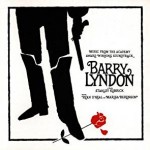
JM: You worked on the soundtrack for Barry Lyndon. How did that come about?
PM: It’s a strange story, that. I was running the record company, it was 1975. I remember, I had a press conference going in the office, and the phone rings. “This is Stanley Kubrick, here. I’m doing a film called Barry Lyndon, and I want to use a piece of music”, and this and that and the other. And I said, “That’s great.” I had all of the journalists around me at the time [laughs], and one of them said, “Who are you speaking to?” Oh, what I said was, “Any chance you could call me back on Monday?” [laughs] This was a Friday evening, you know? And he said, “Do you realize who you’ve been talking to?”
I went on Monday or Tuesday over to London, and instead of the five minutes that he wanted, I sold him 25 minutes of music. But we got on famously together.
The songs were done between us coming to America, because we had Philharmonic Hall, I remember, the Avery Fisher Hall to do that concert I mentioned. And we went to California. This was all new for the band. They had families and kids, and had never been full-time professional before. He said, “Look, I’ll pay for them all. Bring them all over.” And he did. You know, he was a kind man, he was great. I mean, he was totally bonkers, the same as myself. So we went over, played the tunes, finished up in half and hour, and then he threw a Halloween party for us, with firecrackers, in his backyard in London. You know, that’s the sort of person that Stanley to me was, and I’ll always remember. Anytime I wanted to show anything from the film, I’d just ring him up and there was no charge whatsoever.
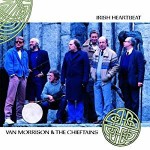
JM: I want to ask about your album Irish Heartbeat with Van Morrison. What was it like working with him?
PM: You mentioned Stanley Kubrick [laughs]. Here we go again [laughs]. Van is the Stanley Kubrick of music, I think. For me, he’s my favorite songwriter.
Oh my God, it was tough times getting it done. Then we toured it for about six months. God, you wouldn’t believe it. And then, he was back again the following year, and we did the best version of “Shenanoah” that’s ever been recorded, for The Long Journey Home. We still keep in touch.
But Van, he never stops. I mean, he still has all that greatness there, if that’s your style of music. But making the album was tough, back and forth. [Grumbles:] “No, no, we’re not going to do that. Keep that for yourself.” [laughs] “Ok, ok. What about this?” Then we struck a happy note. And we went and did a few TV shows. But he thought the whole thing was great fun.
Then we did attempt a few years later to do a second album. We went to this hotel in Dublin, and there was tea and sandwiches and coffee. It went on, and it just started to get funnier and funnier [laughs]. I knew after one day’s rehearsal that this was never going to happen. Forget it. We parted on good terms [laughs].
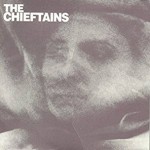
JM: Another album that I want to ask about is The Long Black Veil, where you worked with some rock and pop artists. What are your reflections on that album and what it meant for the band?
PM: All of us had guested on so many albums. Mick Jagger’s solo album – “Party Doll”, I did some piping on that. And Mike Oldfield, Ommadawn, Five Miles Out. And Paul McCartney, I did two tracks with him, the B-side of “Ebony and Ivory”. [“Rainclouds”]. Different people we had worked with… And Don Henley, of course. Not forgetting Don Henley. He was fantastic. And Marianne Faithfull.
I thought, perhaps I should put us together friends, with Irish songs. Mark Knopfler, and Ry Cooder and Sinead, of course. The way that turned out – it just gave me tremendous freedom to come along with songs and say, “I’d love for you to do this.” I mean, Ry Cooder singing “Coast of Malabar” just brings tears to your eyes. It brought tears to my eyes because I remembered my grandmother singing it.
You know, the Rolling Stones, not thinking they’d turn up. They were sitting at the bar with their entourage [laughs]. It was 1:00 and there wasn’t a note on tape [laughs]. This was “The Rocky Road to Dublin”. I said, “Do you mind if I press the button?” And so it starts from there. The party, which was a big party [laughs], you can hear that in the music. It was just wonderful. I mean, I should write a book just about that album. We went to a pub around the corner that stayed open until 3:00 in the morning, and even Mick who had done “The Long Black Veil” song came for the session. He wasn’t drinking or smoking or anything, you know? Just enjoying it. We stayed until 6:00 in the morning [laughs]. It was a great album.
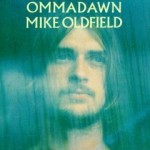
JM: You mentioned the album Ommadawn, which is probably my favorite of Mike Oldfield’s albums. What do you remember about working on that?
PM: One little thing I remember… God, you’re bringing out the stories now that I have to remember for the book. I was in the middle of the tour, and I had a day off. I had a manager who was a New York manager, tough as nails [laughs], Jo Lustig. So he insured me. They flew this small little plane with me down to the south of England somewhere, wherever Mike was staying, this big old house in the mountains [the Beacon]. I remember, there was a mist hanging around. I went in and sat down with Mike, and I said, “OK, what’s the tune?” and started to practice and just to play it a few times. I said, “OK, I think I’ll be able to get a grasp on this”, and he said, “You’ve just done it.” [laughs] He’d already recorded what I’d done [laughs]. I said, “No, look, let me do it again.” “No.” So I was on this private plane that brought me back to London the following day, and I continued the tour. So that was Ommadawn.
I have a photograph of him playing my pipes, and he recorded them and got sounds from them, you know, because he was mad into computers and all that. This is the early stage of computers. He had banks of computers around his house. It was just incredible to see.
JM: You’ve collaborated with a truly amazing collection of artists over the years. Are there a few that particularly stand out to you?
PM: God, there’s been so many. I love Emmylou [Harris], you know? There’s been so many. I’ve never gone wrong with Van [Morrison] at any time – it’s always been great. And I still record… in the last year I did some music with Ry Cooder, too. You have these musicians that are just incredible. Now, this is talking outside of the band. Because The people in the band I’ve played with for so many years, and loved. We have this great understanding.
But guest artists out there. I mean with Pavarotti, too – I did two songs with him [laughs]. I can never forget that happening out in Modena, where he lived in Italy. Great voice, and a brilliant singer.
I’ve put up the phone now and started looking at the list [laughs]. Why didn’t I remember him, her, or whoever? It’s all been great. Like, for instance in the most recent time there, The Low Anthem – we did a lovely song with them, “School Days Over”. They’re a young band. And The Decemberists, and Bon Iver.
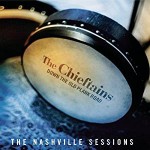
Alison Krauss always puts a little shiver up me back, you know? We did a song with her, “Molly Ban” [on Down the Old Plank Road: The Nashville Sessions]. We did it at the old Ryman Theater, and I remember on that concert we had Earl Scruggs, who was a great friend. I remember ringing up his wife, his late wife [imitates voice], “I believe you want to work with my Earl” [laughs], and then he came, [sings] “Bum bum bum ba-diddly-diddly-diddle”, you know? And Jerry Douglas and Bela Fleck. So many times I’ve worked with Bela. These guys are like they’re from the south of Ireland, you know what I mean? They know the tune after once or twice through. They’re just geniuses, and it’s always a great pleasure to work with any of them – Bela Fleck, Jerry Douglas, and the whole bunch. And they all love us and give us a great time.
JM: The Chieftains have been performing for 55 years. Do you have a secret to longevity? You’re still out touring, and clearly still full of energy.
PM: Well, there’s always lovely, interesting sidelines, different things that we do with our music. We had ten concerts with a symphony orchestra, and I broke my ankle this time last year, and I had a week to go with the Pittsburgh Symphony. And I said, “I have to do it. They’re one of the best symphony orchestras in the world.” So they organized this special transport for me, got me there, and I got a wheelchair. I was able to sit down amongst all the 150 people at the show and perform. The people just loved it. They gave me a great ovation, reception for doing it. You know, I should’ve gone home, really, but the show must go on. So that’s what happened last year. I’ve got to behave myself this time and make sure it doesn’t happen this time [laughs], because we have quite a few concerts to go. But all I can say is, if you talk to to any of the younger musicians in The Chieftains, they’re just mad about playing with the band.


Discussion
No comments for “Interview: Paddy Moloney”